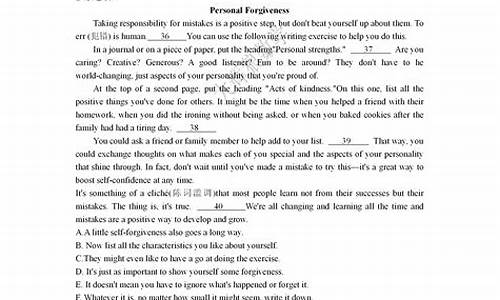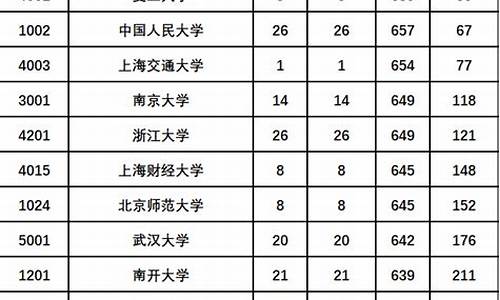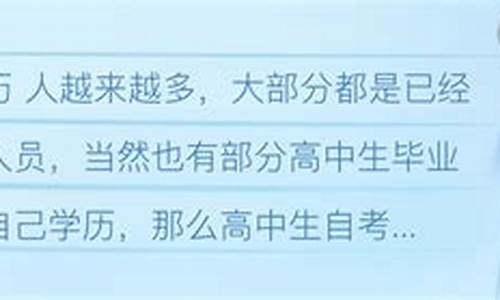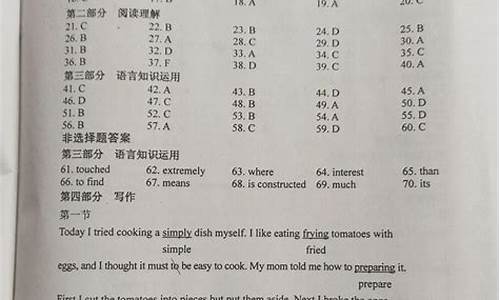您现在的位置是: 首页 > 教育改革 教育改革
英语高考真题2017,17年英语高考题
tamoadmin 2024-05-18 人已围观
简介2015年高考英语一轮复习题库:Module6 Unit 3 Understanding each other Ⅰ.单项填空 1. They have been accustomed to the climate here and ______ a cold bath in winter as well. A. taking B. to take C. taken D. ta

2015年高考英语一轮复习题库:Module6 Unit 3
Understanding each other
Ⅰ.单项填空
1. They have been accustomed to the climate here and ______ a cold bath in winter as well.
A. taking B. to take
C. taken D. take
2. According to the school rules, nobody is permitted ______ in the classroom.
A. *** oking B. to *** oke
C. *** oke D. to be *** oking
3. I don't want to ______ too much of your time, but I do have some important matters.
A. keep up B. pick up
C. make up D. take up
4. The police in Hubei province ______ last Tuesday they had arrested 7 people for their suspected roles in a shooting killing 1 and injuring 10 others on Monday evening.
A. has said B. said
C. had said D. says
5. In the eastern part of New Jersey ______, a major shipping and manufacturing center.
A. the city of Elizabeth lies there
B. around the city of Elizabeth lies
C. there lies the city of Elizabeth around
D. lies the city of Elizabeth
6. — Are your family ready for rafting?
— Yes, I really want my children to experience that ______ they are young. (2013?师大附中月考六)
A. while B. before
C. unless D. if
7. I would like to travel to Tibet. That's ______ I'd do if had enough time and money.
A. which B. why
C. what D. when
8. With two children ______ middle school in the nearby town, the parents are working hard.
A. to attend B. attended
C. attending D. attend
9. — Do you like living here?
— Yes, but I am still ______ to the new time zone.
A. adjusting B. adjusted
C. adapted D. used
10. — Why didn't you answer my phone last night?
— Sorry. I ______ a meeting when you called me.
A. am attending B. was attending
C. attended D. have attended
11. He is never afraid of changes in his life, ______ them as valuable experiences. (2014?长沙一中月考四)
A. viewing B. to view
C. viewed D. having viewed
12. More than 30 cars of the new kind ______ in the first three days after its launch last Saturday. (2014?湖南师大附中月考二)
A. sold B. has sold
C. were sold D. has been selling
13. When the famous singer got there, she did not get the warm ______ she had hoped for.
A. situation B. reception
C. invitation D. celebration
14. The Chinese munity here are shooting off five works in ______ of the Chinese New Year.
A. celebration B. honor
C. memory D. consideration
15. It would have make a lot of ______ if you had told me about it two days earlier.
A. effort B. difference
C. oute D. result
Ⅱ.完形填空
A
(2013?全国新课标卷改编) Michael Greenberg is a very popular New Yorker. He is not famous in sports or the arts. But people in the streets __1__ him, especially those who are poor.
For those people, he is “Gloves” Greenberg. How did he get that __2__? He looks like any other busines *** an, wearing a suit and carrying a briefcase (公文箱). But he's __3__. His briefcase always has some gloves.
In winter, Mr. Greenberg does not act like other New Yorkers, who look at the sidewalk and hurry down the street. He looks around at __4__. He stops when he __5__ someone with no gloves. He gives them a pair and then he moves on, looking for more people with cold __6__.
On winter days, Mr. Greenberg __7__ gloves. During the rest of the year, he buys gloves. People who have heard about him __8__ him gloves, and he has many in his apartment.
Mr. Greenberg __9__ doing this 21 years ago. Now, many poor New Yorkers know him and __10__ his behavior. But people who don't know him are sometimes surprised by him. They don't realize that he just wants to make them happy.
It runs in the __11__. Michael's father always helped the poor as he believed it made everyone happier. Michael Greenberg feels the same. A pair of gloves may be a __12__ thing, but it can make a big difference in winter.
1. A. know about B. learn from
C. cheer for D. look for
2. A. job B. name
C. chance D. message
3. A. calm B. different
C. crazy D. curious
4. A. cars B. people
C. street numbers D. traffic lights
5. A. helps B. chooses
C. greets D. sees
6. A. hands B. ears
C. faces D. eyes
7. A. searches for B. stores up
C. gives away D. puts on
8. A. call B. send
C. lend D. show
9. A. delayed B. remembered
C. began D. enjoyed
10. A. understand B. dislike
C. study D. excuse
11. A. city B. family
C. neighborhood D. pany
12. A. *** all B. useful
C. delightful D. forting
B
(原创)I have often found it interesting talking to foreigners and learning about the cultural differences between countries. I think 1.__________ is important to know about the customs and traditions of different countries in order to avoid misunderstanding.
Last Saturday, I met a man from France, 2.__________ explained to me how the French greet each other. Now I know the French usually shake hands when they meet. If they know each other very well, they kiss each other 3.__________ the cheek. They shake hands again when they are saying goodbye. It isn't unusual for a French person who you met several minutes ago to e and shake hands with 4.__________ again! This is just one of the many French traditions. If you went to live in France, you might find it hard to adjust 5.__________ their ways.
Almost every culture in the world has its own taboos, and it is important to be aware of them. Breaking a taboo could be 6.__________ experience that will upset those around you. For example, in Japan, “4” and “9” are considered to be numbers that are unlucky, 7.__________ the Japanese words for these two numbers sound like “death” and “suffering”. It would be important to know this if you 8.__________ like to visit Japan on holiday.
Ⅲ.阅读理解
(2013?江西) The light from the campfire brightened the darkness, but it could not prevent the damp cold of Dennis's Swamp (沼泽地) creeping into their bones. It was a strange place. Martin and Tom wished that they had not accepted Jack's dare. They liked camping, but not near this swamp.
“So,” Martin asked as they sat watching the hot coals. “How did this place get its name?”
“Are you sure you want to hear it? It's a scary story,” warned Jack.
“Of course!” cried out Tom. “If there were anything to be scared of, you wouldn't have chosen this place!”
“OK, but don't say I didn't warn you,” said Jack, and he began this tale.
Way back in time, a man called Dennis tried to start a farm here. He built that cottage over there to live in. In those days, the area looked quite different — it was covered with tall trees and the swamp was a crystal?clear river. After three hard years, Dennis had cleared several fields and planted crops. He was so proud of his success that he refused to listen to advice.
You are clearing too much land, warned one old man. The land is a living thing. It will hit back at you if you abuse it.
Silly fool, said Dennis to himself. If I clear more land, I can grow more crops. I'll bee wealthier. He's just jealous!
“Dennis continued to chop down trees. Small animals that relied on them for food and shelter were destroyed. He was so eager to expand his farm that he did not notice the river flowing slowly towards his door. He did not notice salt seeping to the surface of the land. He did not notice swamp plants choking all the native plants.”
“What happened?” Martin asked. It was growing colder. He trembled, twisting his body closer to the fire.
“The land hit back — just as the old man warned,” Jack shrugged. “Dennis disappeared. Old folks around here believe that swamp plants moved up from the river and dragged him underwater. His body was never found.”
“What a stupid story,” laughed Tom. “Plants can't…” Before he had finished speaking, he screamed and fainted (晕倒). The other two boys jumped up with fright, staring at Tom. Suddenly, they burst out laughing. Some green swamp ivy (常春藤) had covered Tom's face. It was a while before Tom could appreciate the joke.
1. The underlined word “dare” in Paragraph 1 is closest in meaning to ______.
A. courage B. assistance
C. instruction D. challenge
2. Why did Jack tell Tom and Martin the story?
A. To frighten them.
B. To satisfy their curiosity.
C. To warn them of the danger of the place.
D. To persuade them to camp in the swamp.
3. Why did Dennis ignore the warning of the old man?
A. The old man envied him.
B. The old man was foolish.
C. He was too busy to listen to others.
D. He was greedy for more crops.
4. Why did Tom scream and faint?
A. He saw Dennis's shadow.
B. He was scared by a plant.
C. His friends played a joke on him.
D. The weather became extremely cold.
5. What lesson can we learn from the story of Dennis?
A. Grasp all, lose all.
B. No sweat, no sweet.
C. It is no use crying over spilt milk.
D. He who makes no mistakes makes nothing.
Ⅳ.阅读简答
(2014?雅礼高三月考一) David Jones is probably not somebody you want to hang out with. Not because he isn't a cool person, but because he is living with 40 deadly snakes.
Jones is living in a room for 121 days with more than three dozen constrictors, green mambas, boomslangs and other deadly snakes in an attempt to set a Guinness world record. The record for most days spent confined to a room with this particular number of snakes is 113, set by Martin Smith in 2008.
“I am hoping people will realize that we can live with these fantastic creatures without fearing and killing them. People e and see me here and are constantly amazed at how I am interact with these animals. The snakes are not restrained in any way and make the full use of the entire room including my bed, shower and toilet,” Jones explains. They mainly hide out in cupboards or on the various makeshift (临时的)branches or bushes that Jones has in their shared quarters. Once a week, someone brings captured mice and rats to offer as a sacrifice to the snakes.
David Jones is forced to move the snakes with a “hook stick” throughout the day, so that he can do things like sitting at his desk or typing on his laptop, his only means of contacting the outside world.
The snakes often drop on his pillow or shoulders as he's trying to work or sleep, but there have so far been no instances of Jones being bitten by one of these deadly snakes. He said, “if I give them respect, we can live together happily.”
Jones is doing this for charity. All the money raised will go to a hospice(收容所) in his hometown of Crawley, near London.
1. What are constrictors, mambas and boomslangs? (No more than 5 words)
________________________________________________________________________
2. How is David Jones staying in touch with other people? (No more than 5 words)
________________________________________________________________________
3. Why don't the snakes bite Jones? (No more than 6 words)
________________________________________________________________________
4. What are the purposes of David Jones's doing so? (No more than 15 words)
________________________________________________________________________
Unit 3
Ⅰ.1. A 考查固定搭配。从句末的as well 可知,我们已经习惯了这里的天气也习惯于冬天洗冷水澡。be accustomed to (doing) sth.习惯于某事或做某事。
2. B 考查动词搭配。注意permit 的搭配: permit doing, permit *** . to do。permit 用于被动语态时,要用be permitted to do…
3. D 考查短语动词的辨析。 句意:我不想占据你太多的时间,但是我确实有重要的事情。 keep up 坚持,维持; pick up 捡起,拾起; make up 编造; take up 占据(时间或空间)。
4. B 考查动词时态。由于上个星期二说的,所以用一般过去时。
5. D 考查倒装句。在“主语+谓语+地点状语”的句型中,如果强调地点状语,就把地点状语放于句首,后常用完全倒装的句型,即:地点状语+谓语+主语。
6. A 考查状语从句。experience是及物动词,that作其宾语,其后是一个状语从句。此句的意思是:我想趁孩子们小的时候体验漂流。
7. C 考查名词性从句。what 在此引导的是表语从句。
8. C 考查非谓语动词。children与attend 之间构成主动关系,所以要用现在分词作with复合结构的宾补。
9. A adjust to 适应。
10. B 考查时态。该句用过去进行时符合语境。句意:你给我打电话时,我正在开会。
11. A 考查非谓语动词的用法。 句中的view与主语he是意义上的主动关系,且view在句中充当状语的成分,所以选A。
12. C 考查时态和语态。根据后面的时间状语应在过去时里选择,且主语cars与sell之间是构成被动关系,所以选C。
13. B reception 接待。
14. A in celebration of… 庆祝……
15. B make a difference 产生不同,有区别。
Ⅱ.A 1. A 作者在文章的开头的第一句话告诉我们:“迈克?格林伯格是一个非常受欢迎的纽约人。”四个选项中,能与popular 对应的近义词应为 A. know about (了解,知道关于……的情况)。B.向……学习;C.为……欢呼,加油;D.寻找。
2. B 设空所在句的意思是:对于那些人来说,他是“手套” 格林伯格。他的这个名字是如何得来的呢?故B项name符合上下文语境。
3. B 设空处上下文句意为:“他看上去就像任何其他的商人,穿西装,带着一个公文包。但他也有不同之处。他的公文包里总放有一些手套。”设空处前面的but 非常重要,它表示转折,different表并不一样。
4. B 根据下文作者提到主人公要寻找没有手套的穷人赠送手套,所以他在街上环顾四周要看的是“行人”,B项people 与上下文相符,本段最后一句提到looking for more people with cold ______.也为此作了注解。
5. D 句意为:当他看到没戴手套的人时会停下来。作者上文特别提到“look around”, 而与之相对应的结果应该是“看到”, 所以D为正确答案。
6. A 手套是为冬季感到手冷的人保暖所用,故A项hand与上下文语义相符。
7. C 根据全文可知主人公在冬季纽约街头做的是赠人手套的义举,故C项give away (赠送) 最能表达上述含义。
8. B 设空所在句的句意是:听说他这一义举的人们给他寄去手套,这样他在他的公寓里积攒了许多副(手套),B项send(寄送)符合题意。
9. C 设空所在句的句意为: 格林伯格先生做这一义举开始于21年前。C项begin(开始),符合题意。
10. A 句意为: 现在,许多贫穷的纽约人知道了他,也理解了他的行为。根据作者But后的描述“也有一些人对他的行为产生误解”来看,只有A才是最佳选项。
11. B 设空所在句的句意为:这种义举一直在他们家族内传承。根据下文所述, 主人公的父亲也一向热衷于帮助穷人,可以看出主人公的这一做法是有家庭影响的。
12. A 句意:一副手套可能是微不足道的小事,但它在冬季能产生很大的意义。but前后的句子具有明显的转折含义,所以选A,此句也是整篇文章的寓意所在。
B 1. it 2. who 3. on 4. you 5. to 6. an 7. because/since/as 8. would
Ⅲ.1. D 词义猜测题。根据文章第一段可知这个地方很诡异,Martin和Tom 感到害怕,都希望没有接受Jack的大胆挑战。 A.勇气;B.帮助;C.指导;D.挑战。
2. B 细节理解题。 根据文章第三段和第四段中的“Are you sure you want to hear it?” 和 “Of course!” 可得出答案。
3. D 细节理解题。 根据文章倒数第五段中的“If I clear more land, I can grow more crops. I'll bee wealthier.”可知他想种更多的农作物。
4. B 推理判断题。 根据文章最后一段的“Some green swamp ivy(常春藤) had covered Tom's face.”可知,Tom是因被常春藤的叶子盖到脸部而吓到了。
5. A 主旨大意题。 文章讲到了Dennis太贪婪,不断地开垦土地想把所有土地都种植农作物以获取更多金钱而受到大自然的报复,所以选A(贪多必失)。B.没有汗水,没有收获;C.覆水难收;D.不犯错误的人是不会有收获的。
Ⅳ.1. They are deadly snakes.
2. By using his laptop./Through his laptop.
3. Because he gives them respect./ Because he respects them.
4. To set a Guinness world record and to raise money for charity./He wants to set a Guinness world record and to raise money for charity.
2015年高考英语一轮复习题库:Module 2Unit 1
Tales of the unexplained
Ⅰ.单项填空
1. In order to improve our standard of living we've got to ______ production and export.
A. put up B. turn up
C. show up D. step up
2. Joe's application to the university was not accepted ______ his failing English.
A. instead of B. in spite of
C. due to D. thank to
3. Only after the teacher explained it to me a second time ______ the question.
A. I did understand
B. did I understand
C. I had understood
D. had I understood
4. — You look so worn out. What's up?
— I ______ the spare room all morning. My cousin is ing tomorrow with his son to stay with us for the weekend.
A. cleaned up
B. have cleaned up
C. have been cleaning up
D. will clean up
5. The local news ______ at half past seven in our school every morning, when we have breakfast.
A. broadcasts B. is broadcast
C. is broadcasting D. is being broadcast
6. The doctor took X?rays to ______ the chance of broken bones.
A. carry out B. take out
C. rule out D. turn out
7. High school boys in the country ______ to wear long hair at that time, which you may think quite strange.
A. were forbidden
B. have been forbidden
C. were being forbidden
D. had been forbidden
8. Let's first decide where we are going for a holiday; don't confuse the issue by discussing ______ we are going by road or by rail.
A. where B. whether
C. when D. why 9. — Make sure you wear your life jacket, otherwise…
— I know I ______ drowning if I fall overboard. Thanks for your advice!
A. end up B. will end up
C. will be ending D. will have ended up
10. Everybody in the village likes Jack because he is good at telling and ______ jokes.
A. turning up B. putting up
C. making up D. showing up
11. There was an accident ______ two people were injured on the fourth floor by the elevator.
A. when B. that
C. where D. as
12. The accused had many ______ to say that he was not guilty.
A. judges B. witnesses
C. lawyers D. passers?by
13. I am considering ______ my daughter an electronic dictionary; it is considered ______ a great help to her in her studies.
A. to buy; being B. to buy; to be
C. buying; being D. buying; to be
14. That's really a ______ problem; no wonder all the students looked ______.
A. puzzled; puzzling
B. puzzled; puzzled
C. puzzling; puzzling
D. puzzling; puzzled
15. Mike is a heavy *** oker. ______ he *** okes fifty cigarettes a day.
A. On time B. On average
C. In vain D. In return
Ⅱ.完形填空
A
It was Christmas Eve and everyone was eager to get home. Shortly after __1__, our plane flew into a very heavy, dark cloud. Suddenly, I saw a very bright light on the outer engine on the left. Then the plane jumped down and went into a nose?dive. Passengers were screaming with __2__. Soon the noise stopped and I realized that the plane had broken up and I had been thrown out of the plane. I could see the __3__ spinning towards me. Then I lost consciousness.
I woke the next day. My first thought was: “I __4__ an air crash.” I shouted out for my mother but I heard nothing but sounds of the jungle.
I had some deep __5__ on my legs but my injuries weren't serious. So I could walk. I could hear the planes __6__ searching for the wreck(残骸)but it was a very dense forest and they couldn't __7__ me. In the forest, there were many deadly snakes, looking like dry leaves. I was __8__ that I didn't meet them. I found a stream and walked in the water because I knew it was __9__, away from deadly snakes. At the crash site I found a bag of __10__. When I had finished them I had nothing more to eat. In the day, it was very hot and very wet. But it was cold at night.
On the fourth day, I __11__ a hut(茅舍)with a palm leaf roof. I decided to spend the night there. The next day I heard the voices of several men outside. It was like hearing those of angels.
The day after my rescue, I saw my father. For the next few days, we __12__ searched for news of my mother. On 12 January the rescue team found her body.
1. A. taking off B. breaking up
C. giving out D. turning over
2. A. cold B. delight
C. excitement D. fear
3. A. snake B. hut
C. jungle D. angel
4. A. witnessed B. caused
C. discovered D. survived
5. A. breaths B. cuts
C. wells D. spots
6. A. downstairs B. overtime
C. overhead D. overnight
7. A. rescue B. contact
C. catch D. spot
8. A. lucky B. sad
C. puzzled D. disappointed
9. A. safer B. hotter
C. cleaner D. easier
10. A. guns B. books
C. biscuits D. coins
11. A. founded B. bought
C. found D. built
12. A. briefly B. desperately
C. carefully D. casually B
I was walking in the woods when I was attacked by a snake. The poisonous liquid worked fast. I felt my body falling down. 1.__________ conscious for the moment, I felt dizzy. Snakebites are supposed to take hours to kill you, but only minutes passed 2.__________ I lost consciousness. The next two days I slept in the hospital, unconscious. On 3.__________ third day, from a distant corner of my mind, I seemed 4.__________ hear the sound of my savior's(救世主) voice calling, “Kids from the Bronx won't die in the woods in Kansas!” Suddenly, I awoke to the warm touch of my mother's hand. She was appropriately present on the day of my rebirth. I was blind 5.__________ the time being, but I could see my future 6.__________ clearly than ever. Though snakes nearly killed me, I made up my mind to devote my life to the study of snakes.
Just 7.__________ the German famous poet Friedrich Nietzsche said, “8.__________ doesn't kill you makes you stronger”. Now, I have bee a doctor treating the snakebite. So far, I have saved hundreds of people bitten by snakes.
Ⅲ.阅读理解
(原创)Dolphins are well known for their intelligence. But it turns out that they can also switch on other senses to figure out a problem, just like humans. A new study indicates that when one of their senses is blocked, they can make decisions to use other senses to imitate a human's movements.
In the first experiment, a bottlenose dolphin named Tanner was blindfolded and instructed to imitate the actions of a trainer in the water with him. When Tanner wasn't able to use sight to figure out the movement, he switched to another technique: send out sounds, listen to the echo and interpret the resulting sound waves. This ability — known as echolocation(回声定位法)— allowed Tanner to mimic movements by the trainer, such as spinning in the water.
The study, conducted at the Dolphin Research Center in the Florida Keys, expands on previous studies looking at how dolphins are able to imitate other dolphins while blindfolded. To see if a change in sound would affect their imitation, researchers used humans instead of dolphins to make the movements in the water.
Dr. Kelly Jaakkola said researchers were surprised by Tanner's use of echolocation. She explained that dolphins must decide when to use echolocation, “and that's problem?solving.”
Ja Mann, a professor of biology who was not involved in the study, said the results were not surprising in that they were consistent with how dolphins act in the ocean. “Of course they would use their echolocation to get more information. Dolphins have to solve problems all the time in the wild.” she said.
In the first experiment, trainer Emily Guarino indicated to Tanner that he was supposed to imitate, and placed plastic eyecups over each eye. Wordlessly, the trainer began to spin in the water with his arms wrapped across his shoulders. Tanner then did a similar spin. After that, researchers tested a dozen behaviors that Tanner already knew, including blowing bubbles underwater, swimming like a shark with the tail — or feet — moving side to side and floating on top of the water. Each behavior was tested twice at random, with and without the blindfold, as researchers recorded echolocation sounds underwater. Tanner was just as accurate at imitating a human — blindfolded or not — as he was at imitating another dolphin.
1. We can learn that dolphins are ______.
A. *** art B. dull
C. aggressive D. mild
2. In the first experiment, Tanner imitated a human's movements by ______.
A. seeing B. touching
C. listening D. *** elling
3. It is likely that dolphins swimming in the ocean use echolocation more ______.
A. at noon B. in the day
C. in the afternoon D. at night
4. The underlined word “mimic” means ______.
A. change B. imitate
C. follow D. refuse
5. In the first experiment, plastic eyecups were placed over Tanner's eyes in order to ______.
A. protect their eyes
B. see the trainer clearly
C. blindfold the dolphin
D. send out sounds
Ⅳ.阅读简答
For Robert Valderzak of Washington, D.C., Tuesday's earthquake was a miracle(奇迹).
Ever since he fell on Father's Day, 75?year?old Valderzak had suffered severe hearing loss. But after the 5.8 quake, he could hear everything.
Valderzak was visiting the VA Hospital with his son when the quake broke out. “It shook me terribly — right out of the bed,” said Valderzak. “But after that it stopped. And my son talked to me, and I could hear his voice.”
Tests proved Valderzak's great hearing improvement. His doctors think they have a medical explanation for the miracle. “He had hearing loss caused by fluid(积液) in his middle ear,” said Dr. Ross Fletcher at the VA Hospital. “A bination of a drug he was taking and the earthquake event itself likely led to him losing the fluid and gaining back his hearing.” However, Dr. Jennifer Smullen in another hospital said the shaking itself might not have been enough to clear the fluid from Valderzak's inner ear. “But if somebody was shouting loudly when the earthquake happened, sometimes that's enough to clear some fluid out from the ear,” she said.
“It's a plete pleasure because the event was unexpected and brought a lot of joy to him and his family,” said Fletcher.
Valderzak has been a patient at the VA Hospital since it opened in 1967. Valderzak, an old soldier of the Korean and Vietnam wars, still has a_tough_fight ahead of him. He is suffering from cancer. The event has given him the encouragement he needs to fight cancer.
1. What is the main idea of the passage? (No more than 10 words)
________________________________________________________________________
2. When did Robert Valderzak fall? (No more than 3 words)
________________________________________________________________________
3. According to Dr. Ross Fletcher, what caused Valderzak's deafness? (No more than 5 words)
________________________________________________________________________
4. What does the underlined phrase “a tough fight” refer to? (No more than 2 words)
________________________________________________________________________
Module 2
Unit 1
Ⅰ.1. D 考查动词词义辨析。put up 建起,搭起,举起; turn up 出现,向上翻; show up 出现; step up 增加,加速。句意:为了提高我们的生活水平,我们要加快生产和出口。
2. C 考查介词短语。后面部分是原因状语,故选C。D项thank to 应为thanks to; instead of 是“代替,相反”之意; in spite of “尽管”,用于表示转折。句意:Joe的大学入学申请没有被接受,因为他的英语不及格。
3. B 考查倒装句。“only+状语”位于句首,句子用部分倒装语序,且根据explained可知,用一般过去时,故选B项。
4. C 考查时态。根据语境可知,由于有客人要来,“我”整个上午都在打扫客房,而且可能还在继续打扫。故选C 项。
5.B 考查时态和语态。主语The local news 是谓语动词broadcast 的承受者,用被动语态,这里用一般现在时表示经常性或习惯性的动作。
6. C 考查动词短语辨析。rule out是“排除……的可能性”之意,符合句意。carry out 执行,实施; take out 拿出; turn out 结果是,证明是,生产。根据句意应选C。句意:医生照了X光以排除骨折的可能性。
7.A 考查时态。句意:以前在这个国家的中学生里男生不得留长发,这你也许会感到很奇怪。时间状语at that time常与一般过去时连用。
8. B 考查名词性从句。句意:让我们先决定到哪儿去度假,至于坐汽车还是坐火车去先不讨论,免得把问题复杂化。根据句意可知选B项。
9. B 考查时态。第一个说话人让第二个说话人确认是否穿好了救生衣,否则,如果他从船上落入水中,是会葬身鱼腹的。根据语境可知该空所表示的是将来的动作,用一般将来时即可。
10. C 考查动词短语。turn up 出现,露面,找到,调大(灯,火,煤气等); put up 建起,张贴,为……提供食宿等; make up 编造,虚构,化妆,补足; show up 出席,到场,揭露。由句意可知Jack不但善于讲笑话也善于编笑话,make up符合此意。
11. C 考查定语从句。根据语境可知,______ two people were injured on the fourth floor by the elevator 是定语从句,修饰accident,应用where 来引导,相当于in which。
12. B 考查名词词义辨析。本句的意思是:被告有很多证人证明他是无罪的。故witness(证人)为最佳答案。judge评委,裁判;lawyer律师;passer?by路人。
13. D 考查consider的用法。consider 作“考虑”解,后接动名词作宾语;consider作“认为”解,后接不定式作宾补。consider doing sth. 考虑做某事。be considered to be…被认为是……。
14. D 考查分词形容词。a puzzling problem 一个令人困惑的问题;look puzzled 看起来被弄糊涂了。
15. B 考查介词短语辨析。on average 是“平均”之意,符合句意。on time 按时; in vain 徒劳的;无用的; in return 作为回报。
Ⅱ.A 1. A 飞机起飞后不久就飞进了一团乌黑的云层之中。take off在此意为“起飞”,符合句意。 break up 分解,分裂; give out 分发,发出,用完; turn over 翻动。
2. D 乘客因为害怕而哭叫起来。
3. C 作者从空中向地面飞快下坠,故她看到丛林向她飞旋而来,后面but I heard nothing but sounds of the jungle一句也有提示。
4. D “我”在空难中幸存下来了。survive在此意为“活下来,幸存下来”,符合句意。
5. B 后一句讲到“我”的伤势并不严重,故答案选B。cut在此用作名词,“割伤”之意。
6. C 根据常识判断飞机应当在头顶上飞。overhead在此用作副词,意为“在头顶”,符合句意。downstairs 楼下; overtime 加班加点地,超时地; overnight 一夜之间地。
7. D spot在此用作动词,“发现,看见”之意,符合句意。
8. A 幸运的是“我”没有遇到这些毒蛇。
9. A 后面away from deadly snakes有暗示,可见在小溪中走路可避开毒蛇,更安全一些。
10. C 后面讲到这些东西可吃,可以判断这些东西应当是食品。biscuit意为“饼干”,符合句意,故答案选C。
11. C 第四天,“我”发现了一间茅舍。
12. B desperately意为“拼命地”之意,表现了作者寻找母亲音讯的迫切心情,符合句意。briefly 简短地; carefully 细心地; casually 随意地。
B 1. Still 考查副词。当时“我”仍然还有意识,“我”感到头昏眼花。
2. before 考查连词。不到几分钟,“我”就昏迷过去了。
3. the 考查冠词。序数词前加定冠词the。
4. to 考查不定式符号to。不定式作表语,应加不定式符号to。
5. for 考查习语。for the time being意为“暂时”。
6. more 考查副词比较级。虽然“我”暂时失明了,但“我”看未来比以往看得更清楚了。
7. as 考查关系副词。as引导一个非限定性定语从句,意为“正如……,像……一样”。
8. What 考查名词性从句。what引导一个主语从句。杀死不了你的东西会使你变得更强大。
Ⅲ.1. A 细节理解题。根据第一段第一句Dolphins are well known for their intelligence.可知海豚以聪明著称于世。
2. C 细节理解题。根据第二段第二句he switched to another technique: send out sounds, listen to the echo and interpret the resulting sound waves可知在第一个实验中,海豚是通过听觉来模仿训练员的动作的。
3. D 推理判断题。根据第二段第一句a bottlenose dolphin named Tanner was blindfolded可知海豚是在眼睛被蒙上,不能使用视觉的情况下不得已而使用“回声定位法”。晚上视觉发挥不了作用,故可判断这时使用“回声定位法”的机会肯定要多些。
4. B 词义猜测题。第一段中they can make decisions to use other senses to imitate a human's movements有提示。故可判断mimic是“模仿”之意。
5. C 推理判断题。第二段第一句a bottlenose dolphin named Tanner was blindfolded提到海豚眼睛被蒙上,故可判断在海豚眼睛上面放眼罩的目的是为了蒙上海豚的眼睛。
Ⅳ.1. The earthquake “cures” an old man's deafness.
根据主题句(Ever since he fell on Father's Day, 75?year?old Valderzak had suffered severe hearing loss. But after the 5.8 quake, he could hear everything.)可知本文主要讲美国地震致失聪老人听力恢复。
2. On Father's Day. 根据第二段Ever since he fell on Father's Day可知这位老人是父亲节那天摔倒的。
3. Fluid in his middle ear. 根据第四段He had hearing loss caused by fluid(积液) in his middle ear可知老人的耳聋是由于中耳里的积液引起的。
4. Fighting cancer. 根据最后一段The event has given him the encouragement he needs to fight cancer.可知“艰苦斗争”指的是“抗击癌症的斗争”。









